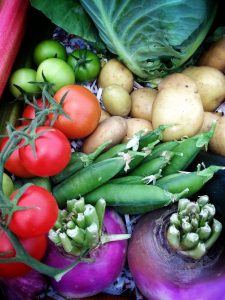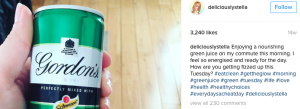BBC Two recently aired a programme that investigates the craze of ‘clean eating’. Since starting this blog, I have become more interested on how this social media sensation is effecting young people, and whether the message it sends is actually positive. This meant my attention was immediately drawn in to watching this programme and seeing what it had to prove. The programme featured Dr Giles Yeo (a health expert), travelling the globe to try and uncover the truth behind the clean eating craze.
Throughout the documentary, audiences were introduced to a few individuals, all involved in the world of ‘clean eating’. A figure that seemed to appear frequently in the documentary was Ella Woodward, better known as ‘Deliciously Ella’. Ella is well known on social media for her plant based recipes, and healt hy eating tips that she offers out. On Instagram she has just recently hit 1 million followers, who all get the chance to enjoy her aesthetically pleasing pictures of her food creations. As she admitted in the documentary, the pictures she uploads take time and effort, as she makes them ‘look pretty’. There is no doubt that ‘Deliciously Ella’ has now become a brand, rather than just simply an individual offering
hy eating tips that she offers out. On Instagram she has just recently hit 1 million followers, who all get the chance to enjoy her aesthetically pleasing pictures of her food creations. As she admitted in the documentary, the pictures she uploads take time and effort, as she makes them ‘look pretty’. There is no doubt that ‘Deliciously Ella’ has now become a brand, rather than just simply an individual offering
up their healthy eating tips. In the documentary, Giles Yeo did question Ella as to whether she actually eats all the food she uploads on her Instagram, and her response was somewhat obvious. She claims to eat every meal that she uploads, and does strictly follow a plant based only diet – in other words, a vegan diet. When questioned, she claimed to see the importance of not letting her way of life be taken out of context by some followers, meaning she didn’t want her followers to think her life was always perfect and happy, due to the wait she eats. It’s clearly believable that she does eat the recipes that are spread across her Instagram, but the important factor that Giles picked up on, was that influential figures like Ella, must be aware that they are making claims and giving advice that may not hold scientific proof. This is where the idea of clean eating has become controversial.
Interestingly, Ella admits herself that the craze of clean eating has become too complicated, and has been taken too far by some. It all started for Ella because she suffered with a rare health condition, which lead to her having very little energy or motivation. She therefore decided to change her diet, and enjoyed sharing these tips with other people. She aimed to inspire her followers, but not force her diet on to others, which some claim can be an issue with clean eating bloggers.

Is Clean Eating solely negative?
In my opinion, clean eating has now become something that is seen negatively, as its driven by social media. The movement has grown, and continues to grow, with more and more people sharing perfect looking meals on Instagram. Arguably, there is nothing wrong with sharing your meals to others, but the difficulty with this craze, is that some bloggers are advising such huge changes to diet, that aren’t actually su
pported by scientific proof. Giles Yeo argues that the way clean eating is exploited on social media is changing the way we eat – and I completely agree. Without the of power social media, this craze would have never had such an impact like it has. As part of the documentary, Giles created his own Instagram account, that shared the food he had eaten. One picture he posted was a greasy (but delicious) looking egg and sausage muffin, and after posting this picture he ultimately lost 30 followers. I found this interesting, as it demonstrates how shaming those for eating how they chose, is very common on social media, and I believe that the clean eating craze can sometimes promote this.
The main thing to remember with the clean eating craze, is that it is driven by belief and not scientific fact. Where one way of eating may work for someone, it might not work for someone else. No one should ever be shamed for choosing to eat in a particular way, and since researching more in to this craze, I’ve found that this is sadly too common. There is nothing wrong with guru’s of clean eating – like ‘Deliciously Ella’, as long as they are aware of how they are responsible for making promises with proof, and not simply giving advice that is scientifically incorrect.
For more information, take a look at the BBC Documentary on iPlayer – definitely worth the watch!
Leave a Reply